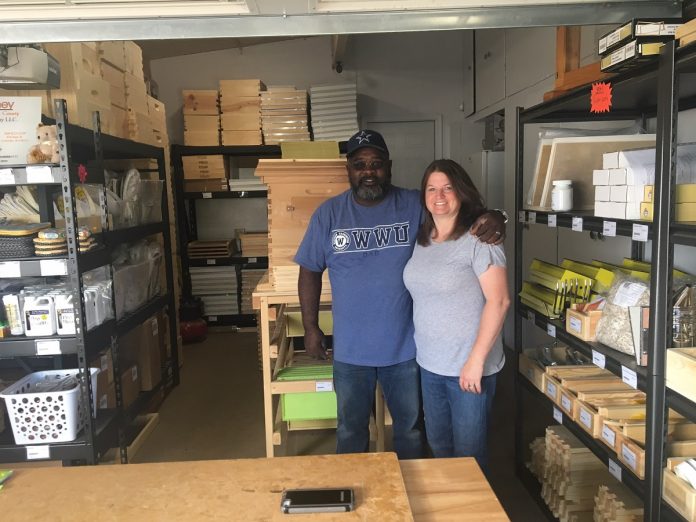
Most people start a business to make money. After all, it takes a lot of time, effort and money just to get a new business rolling. But not the Woods Family. Alan and his wife Bev began Woods Bee Company after their daughter Shana, who worked at the Centralia Deli Honey Hut, told them about endangered honey bees. Shana purchased an educational class for her father seven years ago. They felt it was their duty to help save a species that is vital to our food supply.
 “I’m a Christian, and I believe we should be the best environmentalists in the world, because God asked us to take care of the Earth,” Alan says. “I try to help and do what I can. I can’t do everything, but I can do something.”
“I’m a Christian, and I believe we should be the best environmentalists in the world, because God asked us to take care of the Earth,” Alan says. “I try to help and do what I can. I can’t do everything, but I can do something.”
Alan started out with a free hive he found in a shop, and it grew from there. They started telling others about the honey bee problem and why they are so important to the ecosystem. “Without the bees, we wouldn’t have food,” Alan says. “They are important, and we need to keep them going.”
Unlike many agricultural endeavors, you do not need a lot of space to keep bees. The Woods family has theirs in the backyard of their suburban home. Curious if their neighbors are a bit apprehensive about having so many bees next door, I asked Alan if they minded at all. “No, our bees pollinate their trees and flowers,” he replied. “Plus about once a year we go around and give them all some honey.”
Keeping Costs Low
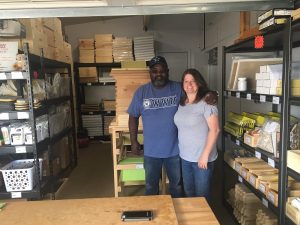
Alan is a pastor at Trinity Christian Fellowship in Chehalis. Bev is a part-time preschool teacher and also works at Thoerbeckes. Since they both have other jobs, the Woods Bee Company, is not about making money. It is about helping people help the bees.
“We prayed about it, and we talked about it and decided to take a $5,000 loan out to try and buy products in bulk to save money,” Alan explains. They found a place in Oregon that made hives and would give them a great deal. Soon after, they got their business license and reseller’s permit so they purchase the other beekeeping products at cost.
So how do they keep costs low for their customers? They do so by only raising the costs of the products they resell by just enough to cover their operating costs, instead of the normal retail mark-up. “We don’t even take salaries,” explains Bev. “And we don’t have really high overhead because our store is in our garage. That helps us keep prices low.”
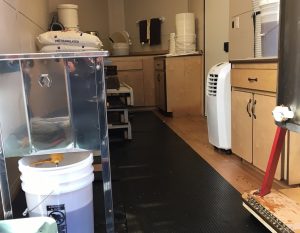
In addition, their store is open by appointment only, so they do not have to hire employees.
If you purchased a complete set-up including hive, suit, smoker, hive tool and brush at a local supply store, it would cost you around $420, not including the bees. From Woods Bee Company the same set-up will cost around $370, including the bees.
Fun Bee Facts
Alan and Bev are full of fun bee facts that you probably never learned in school. Honestly, I could have stayed there all day learning about the fascinating life these insects lead. Here are just a few facts they shared with me:
-
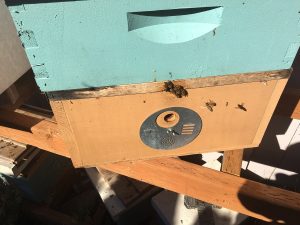
These hives are commons size that people start with. Honey bees really don’t sting you as long they don’t feel threatened. Photo credit: Kristina Lotz Mason bees are the only native bee to the United States.
- Mason bees are pollinators only and do not produce honey.
- Worker bees are all female.
- Bees only live, on average, a month and a half.
- Around October, the drones (male bees), have their wings ripped off them by the worker bees and are kicked out of the hive to die.
- A “swarm” is the name for a group of bees that has split from the hive to start their own
- Bees will not mate with their mother.
- In the winter, the bees dislocate their wings and flutter them rapidly to keep the hive a toasty 99 degrees.
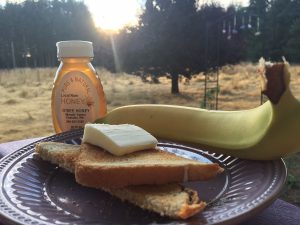
And of course, local honey is great for allergy sufferers. “I used to have to drive to Olympia once a month for an allergy shot,” says Bev. “Since eating our local honey, I haven’t even had to take an over the counter allergy medication. It’s been great.”
Support When You Need It
Alan and Bev also support beekeepers. They have a newsletter, blog and, coming soon, a YouTube video with tips and tricks they have learned about keeping healthy bees. Alan also travels to people’s homes to help them get set up and teach them about bee keeping. “I want to teach others how to do this for themselves,” he says. He charges just enough to cover gas and maybe a bit of his time, with the goal that after a bit, he will not be needed anymore except for supplies. He said he provides that service because it is hard to find someone in the bee industry willing to teach. “I had to drive to Stanwood to talk with someone willing to mentor me when I first started,” he explains.
To get started with your own hive, contact the Woods Bee Company. You can visit the Woods Bee Company on their website, via their contact form or by calling 360-623-3359.













































